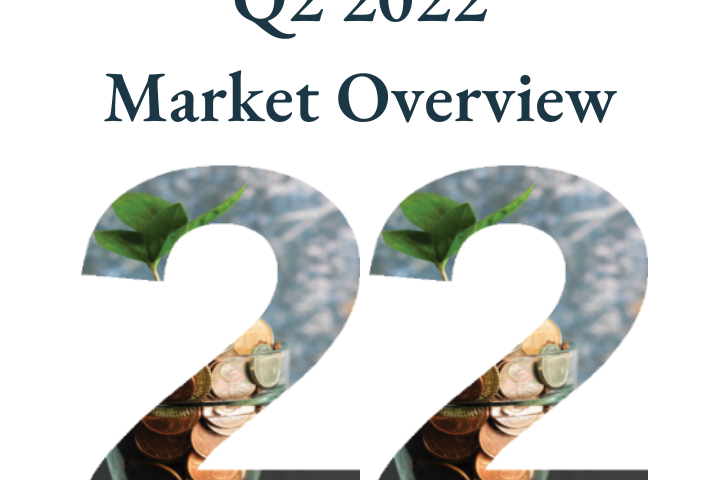Market Overview Q2 2022
 Introduction
Introduction
Rising inflation and expectations of a series of interest rates hikes in the US, UK, Europe and elsewhere have triggered a broad market sell-off in most asset classes including equities, fixed income and property with the notable exception of Chinese equities which performed well in the second quarter. Chinese equities benefited from expectations of an economic rebound following the lifting of strict covid lockdowns in Shanghai and other major cities.
Inflation has continued to rise in recent months due to higher energy and food prices linked to the war in Ukraine and further covid related supply shocks. Persistently high inflation and signs that inflation is becoming more broad based are putting pressure on the US Federal Reserve and other Central Banks to raise interest rates faster than expected at a risk of triggering an economic recession. Recent comments made by Central banks members imply that they would be willing to risk a recession in order to bring inflation under control.
Rising prices and in particular higher energy and food prices are having a negative impact on consumption with demand starting to soften and consumer sentiment worsening. Higher interest rates are likely to worsen the cost of living crisis through higher loan and mortgage payments. There are signs that workers are demanding higher wages and are willing to strike to achieve better living standards. This in turn may lead to higher inflation and more supply shocks as can be seen in the travel sector. The increased risk of a recession is starting to be priced in some commodity sectors such as industrial metals which are sensitive to economic demand. As an example, the price of copper is down 20% year to date.
In an environment where economic growth declines, we would expect cyclical sectors to come under pressure and defensive sectors such as utilities, healthcare and consumer staples to perform better as earnings in these sectors tend to be less vulnerable to economic downturns. Government bonds may also start offering attractive value assuming inflation is reigned in over the next year or so.
To put into context the sharp market sell-off since the beginning of 2022, it is worth remembering that the S&P500 rose by 47.5% between January 2020 and December 2021 at a time when the global economy was going through one of its worst downturns since the second world war. The S&P 500 is down 20% year to date but still well above where it was when the pandemic started. The recent sell-off is in part a rebalancing after a two-year bull market triggered by ultra low interest rates and very accommodating monetary and fiscal policies.
Arguably some of these policies have led to unsustainable financial assets’ valuations and have contributed to the current inflation pressures. Unsurprisingly assets where speculation was rife such as crypto-currencies and early stage technology companies have declined the most. The recent sell-off means that government bond yields are now getting more attractive and equity valuations are normalising after two years of excesses.
 US
US
US markets fell dramatically during Q2 with the S&P lower by 9.41% and the tech heavy Nasdaq down 15.74% as worries about inflation continued to worry investors.
In an effort to bring down inflation which hit its highest level since 1981 in March, the Fed is raising interest rates aggressively. In June, the central bank raised rates by 0.75% to a range of 1.5% to 1.75% after lifting rates by 0.50% in May. With inflation still not easing, a further 75bps hike is widely accepted to be introduced in July. The central bank is now trying to balance reducing inflation without triggering a recession which they have stated will be challenging.
While the US economy appears in good shape the recent US PMI data showed a slowing from 53.6 to 51.2 in June. The manufacturing component to a 2-year low of 49.6, with a level under 50 showing a contraction.
On the plus side, the US consumer is in a solid position following increased savings during the pandemic. Following the financial crisis in 2007 more Americans (95%) hold long-term fixed interest mortgages and banks are now better capitalized so any recession, while difficult may not be as damaging.
 Europe
Europe
Eurozone markets fell sharply through the quarter, continuing the declines from the start of the year as the war in Ukraine continued and concerns over gas shortages increased. The MSCI Europe ex UK fell 8.65%, with the 2 main indices the German Dax30 and French CAC40 down 9.66% and 7.22% respectively.
With inflationary worries, consumer confidence has fallen dramatically in the region and will likely not be eased in the short-term. Estimates for June inflation are 8.6%, up from 8.1% in May with energy the largest contributor. We have already seen disruption in gas supplies from Russia and these could easily escalate. The region is heavily dependent on Russian gas and shortages could have very damaging consequences with Germany already moving to phase 2 of its emergency energy plan.
Ongoing elevated inflation means the ECB is poised to lift interest rates at its meeting on 21 July, with a further rise likely in September.
 UK
UK
UK equities fell over the quarter with the large-cap MSCI UK down 2.94% while smaller companies, represented by the MSCI UK Small-Cap index fell 12.11%. Large companies held-up relatively well overall as defensive areas outperformed and companies exposed to energy did well. UK smaller companies in contrast were heavily exposed to fears of higher inflation and the cost-of-living crisis which led to selling on valuation concerns.
UK households and smaller businesses are being hit hard with energy prices rising sharply. To combat this ex UK Chancellor Rishi Sunak unveiled additional measures to help households including a one-off living payment of £650 to around 8m low-income households.
The Bank of England has estimated inflation could reach 10%-11% in the Autumn and has already raised the base rate with two consecutive 25bps hikes.
 Asia & Emerging Markets
Asia & Emerging Markets
The MSCI Asia ex Japan index was down 1.35% over the quarter which saw a wide spread of performance across the region with the Chinese index rising 12.12% over the quarter.
Chinese equity markets have fallen consistently since early 2021 after the Government introduced new regulations across a number of key sectors and investors became concerned over American listed technology companies. The rise of Omicron in Shanghai in early 2022 led to a full lockdown confining 25m people to their homes and further exacerbated market fears. This was finally eased at the start of June and led to some strong returns through the month.
Investor sentiment was boosted towards China with news that factory activity grew in June and the Government started introducing stimulus to boost the economy.
The Japanese market fell 7.44%, affected by macro concerns and monetary policy. The yen weakened against the dollar and breached the 130 level for the first time in 20 years.
 Global Bonds
Global Bonds
Fixed Income markets continue to weaken as inflation pressures intensified. Rising energy, wheat and fertilizer prices linked to the war in Ukraine have added to the existing inflationary pressures coming from continued covid related supply chain issues.
The US Bloomberg Aggregate bond index is down 4.7% in the second quarter bringing the performance in the first half of 2022 at -10.35%, one of the worst performances on record.
The US Federal Reserve board decided to raise interest rates by 0.75% at its last meeting and indicated that they would continue to raise interest rates quickly to reach around 3.4% by early 2023 in order to control inflation. Other Central banks have also indicated that they will raise interest rates to bring inflation back to target (around 2% p.a.).
The worsening economic outlook has led to corporate bonds and in particular bonds of companies with higher credit risk (high yield bonds) to underperform government bonds.
 Commodities
Commodities
Returns in commodity markets were again widely spread with energy again the best performing amid rising demand and the war in Ukraine causing supply issues. WTI crude oil was up 12.12% for the quarter and natural gas 1.89%. One year returns for these commodities are 81.92% and 61.59% respectively.
Industrial metals all performed poorly with large falls in aluminium, nickel and zinc. Gold posted a small gain for the quarter of 0.15% while silver fell 12.15%.
Global Market Returns
| Sector | Q2 2022 | 1 Year |
| Performance (GBP) | Performance (GBP) | |
| Equities | ||
| MSCI UK | -2.94% | 9.20% |
| MSCI UK Small-Cap | -12.11% | -19.70% |
| S&P 500 TR | -9.41% | 0.20% |
| Russell 2000 | -10.32% | -15.20% |
| MSCI Europe ex UK | -8.65% | -10.57% |
| MSCI Japan | -7.44% | -8.92% |
| MSCI Asia ex Japan | -1.35% | -14.72% |
| MSCI China | 12.12% | -22.41% |
| MSCI India | -6.38% | 8.29% |
| Alternatives | ||
| Bloomberg Gold | 0.15% | 15.25% |
| Bloomberg Silver | -12.63% | -12.50% |
| Bloomberg Copper | -15.63% | -1.46% |
| Bloomberg WTI Crude Oil | 18.15% | 81.92% |
| Bloomberg Natural Gas | 1.89% | 61.59% |
| Property | ||
| MSCI UK Monthly Property (as at 31/3/2022) | 5.64% | 23.92% |
| Fixed Income Indices | ||
| Bloomberg Barclays Sterling Gilts | -7.83% | -14.31% |
| Markit iBoxx GBP Corporate Bond | -5.69% | -11.30% |
| Bloomberg Barclays US Treasury 7-10 Year | 3.58% | 1.81% |
| Bloomberg Barclays Global Agg | -0.54% | -3.59% |
| FTSE World Government Bond Index GBP | -1.24% | -5.33% |
| Cash | ||
| SONIA Lending Rate | 0.22% | 0.36% |

 Introduction
Introduction US
US Europe
Europe UK
UK Asia & Emerging Markets
Asia & Emerging Markets Global Bonds
Global Bonds Commodities
Commodities